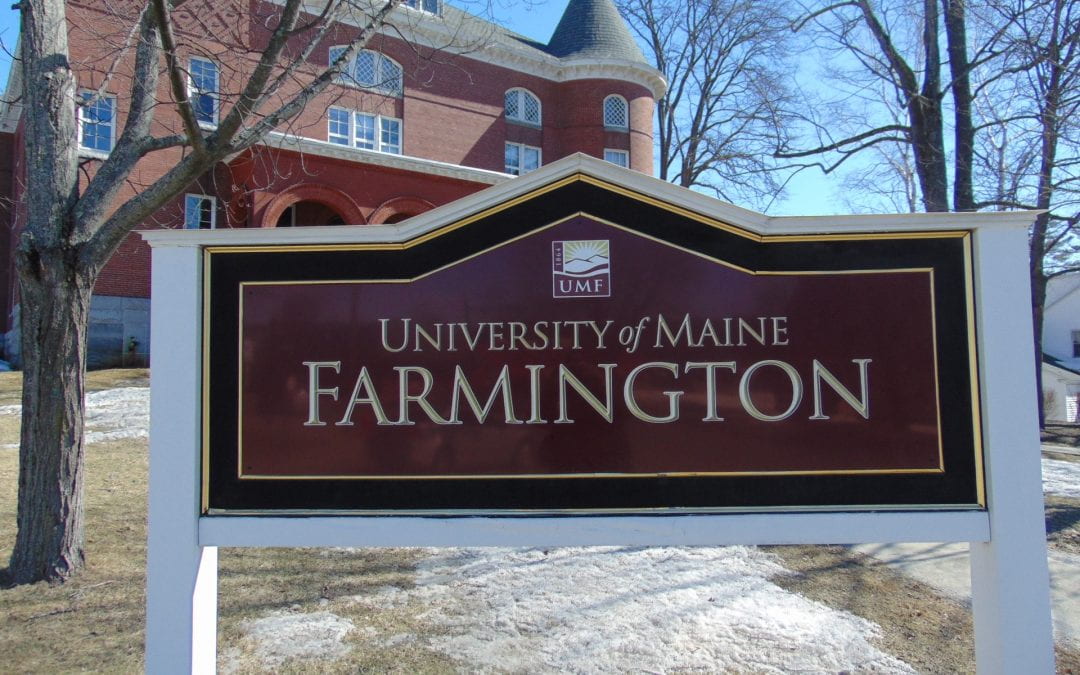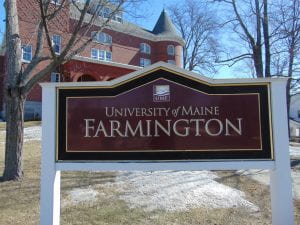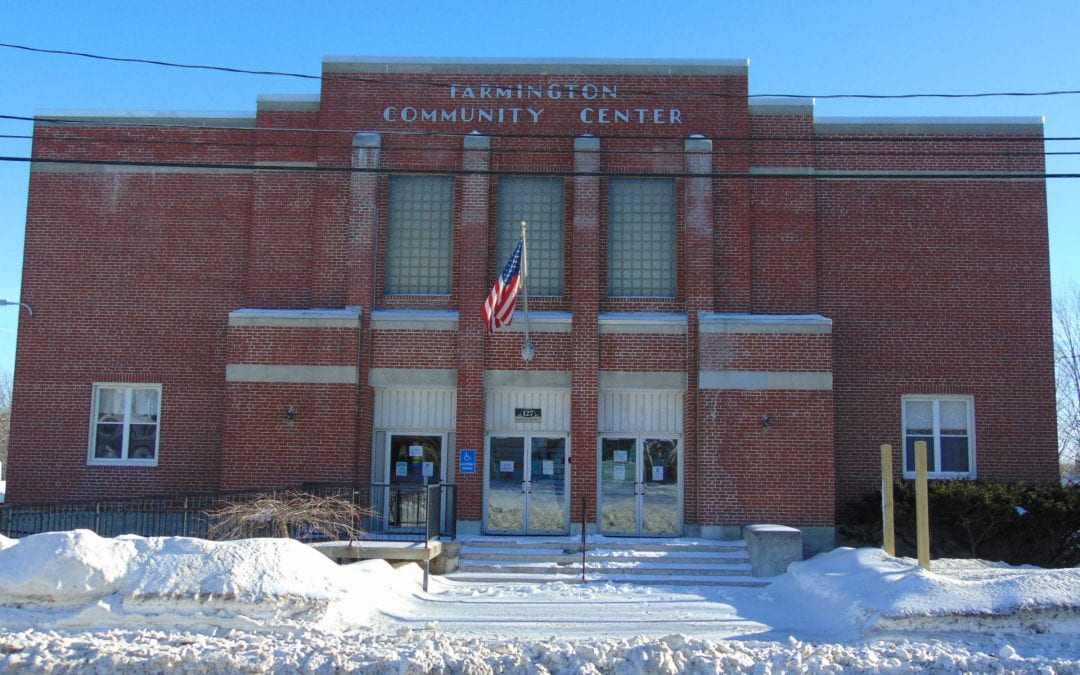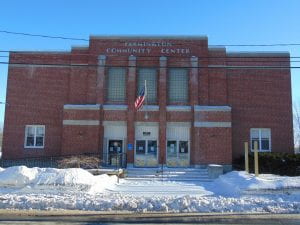
Apr 7, 2021 | Archives, News |

University of Maine Farmington by Sam Shirley.
By Daniela Lilly Rodiles, Staff Writer
Chancellor Malloy announced to faculty, staff, and students of the University of Maine System (UMS) the return to normalcy through traditional and in-person college experience in the coming fall 2021 semester.
The prioritization and continuation of COVID-19 asymptomatic testing together with mask wearing and physical distancing will continue to be in place as a way to assure student and faculty safety for the ongoing spring semester and commencement plans.
“We’re kicking our planning into high gear to provide the most traditional, on-campus college experiences this fall that we can safely manage,” said Malloy. This return to normalcy is focused on resuming in-class instruction, campus activities for the community, and residence hall occupancy resembling pre-pandemic conditions on campus.
UMF students have regained a sense of hopefulness and confidence regarding the plans to return to the conventional college experience that most students knew before the start of the pandemic, and that we all continue to miss. “I feel relieved,” said Anika Slowing-Romero, a freshman majoring in Rehabilitation and Psychology. “This year has been extremely hard and not what I expected at all, college-wise. But I am very hopeful and excited for what’s to come in the next semester.”
Chancellor Malloy’s email became the topic of discussion and conversation between peers, lighting up the possibility of brighter days around the corner, whilst acknowledging the outstanding resilience and commitment that has led all of us to this great news. “Your health and safety, and the health and safety of our university communities, remains our top priority,” stated Malloy, as he confirmed the plans that rely on the pandemic-ending vaccines and health safety practices imposed by the UMS Scientific Advisory Board, as well as Maine’s public health authorities as the basis to keep the UMS community safe.
The plans for commencement at UMF continue to uphold a remote ceremony to celebrate the class of 2021 and their achievements. “We promise to create a wonderful, albeit virtual, celebration experience and program with distinct recognition and personal touches especially for you and your achievements,” stated President Edward Serna.
The University will continue asymptomatic strategies and monitoring for COVID-19 throughout the semester to assure the safety of all students and staff until the last week of the semester.
Apr 7, 2021 | Archives, News |
By Malcolm Langner, Assistant Editor
On Jan. 20, Joe Biden, in his first day in office, officially signed the documentation which allowed the United States to rejoin the Paris Agreement, a deal which was originally signed back in 2016 by nearly 200 countries. The United States had been one of the many countries to sign on with the deal, but decided to leave the agreement under the Trump Administration on Nov. 4, 2019.
Marcia Hartwell, a political science professor at UMF, believes that The Paris Agreement holds plenty of importance throughout the world, especially with the recent and ongoing concerns over global warming. “I believe it is important for the U.S. to align themselves with the global issues, as no country is unaffected by climate change and related government issues.” said Hartwell. “Rejoining the Paris Agreement sends a signal that the U.S. acknowledges its national and global importance.”
Global warming has provoked extreme weather across the globe, and such weather is appearing to become more and more common. The U.S. is one of the greatest contributors to the effects of global warming. When the U.S. left the agreement, many feared industrial regulations would be limited and these worldwide concerns would only grow larger. “The 2019 UN Office for Disaster Risk Reduction documented in their 2019 report ‘Human Cost of Disasters 2000-2019’, that the extreme weather events experienced by the U.S. such as hurricanes, excessive rain and violent storms, extreme heat and cold, have accelerated worldwide in the past twenty years,” Hartwell said. “These events cross international borders and no country has escaped the human, social, and economic costs to its infrastructure.”
The ramifications for a widespread, unified coalition benefit the majority of parties across the world. Hartwell believes that maintaining close relationships globally will help combat cross-border environmental disasters. “Building international coalitions to assist with cross border emergency responses and collaboratively plan prevention strategies will help all countries manage and reduce current and future impacts and risks,” said Hartwell. Hartwell also notes that emergency response units like firefighters, paramedics, and the Red Cross will have greater capabilities in assisting those in need.
The Paris Agreement also creates a widespread sense of community. It helps send out a message of willingness to tackle one of this generation’s greatest obstacles. “The U.S. can also intensify efforts to increase climate change education, training, public awareness, participation, and access to information by utilizing transparent and relevant communication strategies on the local, regional, national, and international levels,” Hartwell said. “These are the first steps in the many needed to maintain and create a better global environment.”
The news comes during the transition of the end of Donald Trump’s presidency to the start of Joe Biden’s. Trump had little environmental plans and put greater emphasis on fewer restrictions, favoring the economy over the environment. Biden has already displayed vastly different ideals, putting the environment and the well-being of the planet ahead of economic value. Despite this, the Biden administration is seeking out environmental changes which can also help boost the economy.

Mar 6, 2021 | Archives, Feature |
By Samantha Pond, Contributing Writer

The Farmington Recreation Department by Sam Shirley.
While school-age children are finding themselves stuck at home without access to activities and sports, the Farmington Recreation Department has stepped up to bring the community together.
Farmington Parks and Recreation, also known as Farmington Parks and Recreation, is an organization that provides activities and facilities to all members of the community. This organization is where children often attend after school programs, sport practices, and fun activities. COVID-19 has created unforeseen struggles within the organization, but they have found a way to bring the community together through the Internet.
The Farmington Parks and Recreation Facebook page has become an outlet for the community to learn new things, have access to arts and crafts, and partake in fun activities. Marissa Goodwin, a second year student at UMF, has been a part of the Farmington Recreation Department for two years now. She has also been a part of providing an outlet for children online. “We started creating online videos of all sorts of things so that the kids could watch them and learn new things,” Goodwin said. “We have all kinds of things like cooking, exercising, ice fishing, sign language, yoga, and the list goes on.”
Each activity targets a wide range of people, not just the youth of the community. Parents can also learn new things from the short videos alongside their children.
The videos have become weekly for the recreation department. At the beginning of each week one can find a day-to-day schedule of activities to watch for free. The Facebook page also provides updates on sports opportunities and updates for the local ice skating rink.
COVID-19 has played a role in every decision this year and definitely brought some difficulties to the recreation department, as the usual activities for the recreation department came to a halt. “The [Recreation Department] decided that it was safer not to have the after school program,” said Goodwin. “So instead, we have been extremely busy trying to think of ways to keep the children active.”
Although this has overall been well-received by the local community, it will always be hard to replicate in-person activities because the energy isn’t the same. “Things are a lot quieter when I go in now. Normally there is lots of noise because of the kids,” Goodwin said. “I love going to work and joking around with the kids. I miss being able to run around and play games with them the most.”
The Farmington Recreation Department has been constantly coming up with new exciting ideas for the community. “We recently put together a February vacation box with a bunch of activities for the children to do over break.” Goodwin said.
These activities have provided a break for parents who have become overwhelmed with remote learning and those who are struggling to find activities for children to be involved in. “I think the kids are getting entertainment from the videos and activities we have been putting out for them,” Goodwin said. “I think it is a really great thing, especially for the kids who don’t have a lot to do at home.”
If community members or UMF students are interested in getting involved with Farmington Parks and Recreation, Matt Foster can be reached via phone at (207) 778-6538 or you can email the Farmington Recreation Department at info@farmington-maine.org.
Mar 6, 2021 | Archives, News |
by Maxen Ryder, Distribution Manager
UMF is welcoming Cortney Benjamin as a new Spanish professor this year. With Benjamin’s experiences visiting Buenos Aires and passion for the Spanish language, she has been labeled as a great addition to the UMF language faculty.
Benjamin has been learning Spanish most of her life. However, she was originally intent on learning French. “I was in middle school and I really wanted to take French, but my mom told me I had to take Spanish since there were more Spanish speaking communities near me when I was growing up. She thought it would be more useful, so I took both,” said Benjamin.
When planning out her young adult life, Benjamin was advised to stick to one language and dive into one culture. “I planned on taking both [Spanish and French] all through college and when it came time to study abroad I was gonna do one semester in Buenos Aires and one semester in Paris, but the study abroad advisor told me it would be a better idea to just pick one place and stick with it the whole year,” said Benjamin.
Originally from North Dakota, Benjamin felt a culture shock while experiencing Buenos Aires. “It was a very big change for me,” said Benjamin. “You know, I’m from Fargo, which is the biggest city in North Dakota, but it’s still not that big. And it’s not a place that people move to from other places. You are either born in North Dakota, or you’ve moved away from North Dakota…But Buenos Aires was huge, and I remember feeling like I had so much freedom.”
However, Buenos Aires was a great influential experience for her. “It’s such a wonderful place,” said Benjamin. “The architecture is so beautiful. It’s a very international city because of the different waves of immigration that came to Buenos Aires. Yeah, it really opened my eyes to living somewhere besides North Dakota.”
These experiences clearly instilled a passion for the language in Benjamin, as noticed by student Rachel Beechin. “I thought she had a real passion for the subject and was always eager to answer questions,” Beechin said.
When first arriving at UMF, Benjamin liked the small, tight-knit liberal arts community. “I think the liberal arts are so important. It’s so important to learn to think creatively and think critically, it’s important to learn how to write well,” said Benjamin. “It seemed like the students really had a voice on campus…and I really like the close relationship between faculty and students on campus.”
Benjamin’s background and values have increased her strengths as a Spanish professor. Alba Fernández, a Spanish teaching assistant, admires Benjamin’s passion for going above and beyond in teaching Spanish.”She teaches from a cultural perspective. She cares a lot about each student. If you have a particular situation and you need help, if you need to Zoom from home, or if you need extra help, she is willing to help,” said Fernández. “Learning a language involves your previous knowledge and your skills depend a lot on your work, but also who’s there on the other side helping you.”
To Fernández, having that personalized attention from the professor can make a difference when learning a new language. “Cortney [Benjamin] really cares about your particular case, not only with your schedule or personal issues and stuff, but she [also] cares about your individual learning process,” said Fernández.
Benjamin has found that the most meaningful benefit for her through teaching is the impact she has on her students. “I think it’s just helping students find their place as a global citizen, to think about themselves as citizens of the world,” said Benjamin.
Benjamin finds herself in a lot of students that haven’t explored the world outside of New England, as she had once been a young person who had never left her home state of North Dakota. “I think language classes are a way to explore the rest of the world in a fun way that may lead to future career opportunities and future travel once the pandemic is over, hopefully,” said Benjamin. “So I think what’s important to me is helping students develop some cultural humility and realize how hard it is to learn another language.”
Because of her experiences studying abroad, she always encourages students to take the opportunity to explore the world while attending UMF during safer circumstances through the international study abroad programs. “Study abroad is so important and it’s so important to what I do,” said Benjamin. “Hopefully, once the pandemic is over, there will be a lot of opportunities for UMF students to study abroad.”
If students are interested in studying abroad, she welcomes students to come to her with any questions they may have. “I’m always available to talk to students about my study abroad experience in Buenos Aires because it was such a life-changing experience for me,” said Benjamin. “It really opened my eyes coming from a more rural area of the United States. I hope that UMF students are able to take part in that sooner rather than later.”
If students are interested in studying abroad, email Lynne Eustis, Assistant Director of Global Education, at leustis@maine.edu to schedule an advising session or visit the Office for Global Education in room 106 in the Fusion Center.
Mar 6, 2021 | Archives, Feature |
By Abby Pomerleau, Contributing Writer
If on-campus housing is not the best fit for a student’s college experience, off-campus housing is a healthy alternative for UMF students.
Residence halls are where many students get their first taste of freedom. Although it can be a good fit for some, residence halls are not for everyone. This leads students to look elsewhere for living. The most common options are commuting from home or renting an apartment. Apartments in Farmington become more scarce in February and March when students begin to tour apartments and sign leases.
Many first-time renters don’t know where to start. What is considered expensive? Is this apartment a “steal”? Katelyn Rouleau, a sophomore, is living off-campus this year for the first time. “The process was overwhelming. I had no idea where to start,” said Rouleau. “I currently pay $470 a month for a two bedroom apartment.” Rouleau said this is all inclusive, which means that the apartment comes with heat, electricity, and other utilities. $470 a month is roughly the average cost of apartments. The quality of the apartment and the number of roommates will determine the price.
Signing a lease can be intimidating. Remembering to read each word is important before signing your name on any document, leases included. Although renters may be stressing about signing a lease, landlords are also stressed about signing renters. Tor Goettsche Spurling, a local landlord who owns Gotcha Apartments feels this way annually. “I always stress each year about filling the rentals with tenants, but I’ve never had an apartment go vacant,” said Goettsche Spurling. “However, what I would say is that the struggle is to find the good tenants.”
Many landlords look for various things in a renter. Goettsche Spurling speaks about what interests him in a good tenant. “I primarily look for someone who pays rent on time, keeps a clean apartment, is self-sufficient and kind,” said Goettsche Spurling. “If they are students, I like to see that they have part-time jobs or are involved with something on campus.”
When looking for an apartment there are many physical things about the apartment that those looking to rent should look out for. “Some things I don’t like as a renter are stained rugs, water damage to walls and ceilings, mold, odors, and pets,” said Rouleau. “If you plan on having a pet, make sure your landlord is aware and approves of it.” More often than not, landlords have people pay an additional fee for pets.
There are some pros and cons when it comes to renting an apartment. “Some pros are that with COVID-19 you don’t need to wear a mask to go to the shower or bathroom, you can buy your own groceries, and you have your own space and freedom,” said Rouleau. “With that said, the cons are that you have to manage your money. Landlords expect a check each month, regardless of your situation. Expenses add up quickly, and you’ll find yourself having no choice but to prioritize the right things.”
If finding an apartment is so stressful, why not just stay on campus? “Living off campus allows you to have an independent lifestyle that you don’t necessarily have on campus,” said Rouleau. “As you get older you want to make more and more decisions for yourself. Living off campus provides that freedom.” Living off campus allows students to gain life skills such as cooking, cleaning, and money management. It even allows for an easier transition into post-college life.
Finding the right apartment can be a challenge, but it’s not impossible. As the semester continues, students will be signing leases for apartments often. Students want the best apartment, and they waste no time finding it. Finding the right apartment for you depends on what you can financially afford, what environment you desire, and the amount of roommates you want, if any.
Mar 6, 2021 | Archives, Feature, News |
By Paige Lilly, Contributing Writer
Before the pandemic, tutoring was one of the most readily available services for students at UMF. At almost any time, students could walk into the Mantor Library and there would be a tutor waiting to help them with their needs. Additionally, students could set up times to meet with tutors in specific subjects.
However, COVID-19 has made these services more difficult to access. Without searching, it would be easy for students to assume that tutoring services are currently available. However, tutoring is still a service that can be used by students if they need it. Cassidy O’Donnell, a sophomore actuarial science major who has been working as a tutor for the computer science department and the learning commons since the beginning of the academic year, has been a tutor since the beginning of this year. Therefore, pandemic-style tutoring through Zoom is all she has ever known.
The style of tutoring is different for each job. “The computer science department creates a flyer of all of their tutor’s zoom meetings and the times. Then the department emails it out to their students,” said O’Donnell. “Students are free to come to the sessions whenever they need help.”
There are multiple tutors for the department, most of which do not overlap with each other. O’Donnell says that this is convenient because students can check the list and find a time with a tutor that works for them.
With the Learning Commons, students control the schedule instead. “Students can schedule appointments using the Navigate app or online through Navigate, which is accessible through MyCampus,” O’Donnell said. In the Navigate app, students are able to select their tutor, the time for the session, what subjects they need help with, and any additional information they would like to provide to their tutor. This allows students and tutors to find times that work with their busy schedules.
Mullein Francis, a sophomore biology major and tutor, is also employed through The Learning Commons tutoring program. She highlighted a few challenges that tutoring on Zoom has presented. “It can be hard when tutoring subjects like math, when you really just want to point to something on the paper to show them,” said Francis. “When you’re on Zoom, you have to work with the camera, switching between writing things on your paper and holding it up to show the person you’re tutoring.” Although this is a struggle, Francis said that tutoring over Zoom has generally been a positive experience.
One thing that Francis likes about tutoring over Zoom is the flexibility that it offers for both the tutor and the student. “It’s nice because Zoom meetings can be a lot easier to fit into my schedule,” Francis said. “When you’re in person, it can be harder to find a time that works, because you have to factor in the time to physically get to the meeting, which can make it tricky.”
O’Donnell enjoys the positive impact that tutoring has on students. “The tutoring program is confidential so students don’t have to worry about tutors talking to each other or other students about them,” O’Donnell said.
Francis also encourages students who need some extra help to sign up for a virtual tutoring session. “School can be so stressful,” she said. “It’s rewarding to be able to help people get rid of some of that stress.”
To schedule a tutoring session with the Learning Commons, download the Navigate app on your smartphone’s app store.



